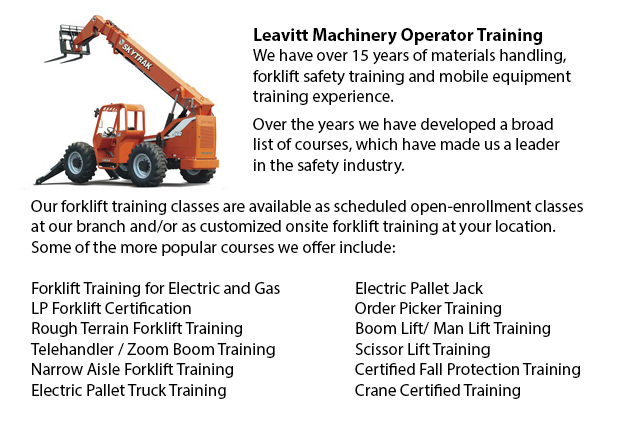
Telescopic Training Alberta - Telescopic Handlers are a type of forklift, often known as telehandlers. This machinery has been increasing in popularity due to its greater lift heights and its versatility. It is usually preferred over the traditional masted counterbalance truck (rough and standard terrain). Whether utilized for transporting pallets in a warehouse or for transporting raw materials into the back of a dump truck, the telescopic forklift is an important equipment. Accredited telescopic handler training is vital to ensure the safe and efficient operation of the unit.
The kinds of lift trucks have been designed to deal with heavy things using a telescoping arm which extends into many parts like a telescope. The things to take into consideration when choosing the best telescopic forklift are things like how the equipment is going to be used and for how long. Required lift heights and work site terrain have to be considered. Cost, warranty, and parts are all factors involved in purchasing a telescopic forklift. If you are leasing, you will want to compare terms, delivery costs and prices.
Telescopic forklifts come in a variety of sizes. Size influences the amount of weight that could be loaded onto the lift, and the heights which could be attained safely. A small- to medium-sized telescopic forklift is perfect for transporting supplies into the back of a pick-up truck. Lifting heavier things up higher would require a bigger lift. Careful consideration of how the lift would be utilized helps ensures you will pick the best size for safety and stability.
Attachments are another consideration when selecting equipment. Ask what attachments are available from the manufacturer. There are pallet attachments, bucket attachments and other attachments for specific reasons.
The selection of tires for the telehandler will depend on the flooring and terrain of the worksite. Smaller units will typically have cushion tires constructed with rubber all the way through. Cushion tires are best for telehandlers being utilized within a warehouse with a concrete floor. They provide stability and durability. Pneumatic tires are normally on larger units used on varied, outdoor terrain where there can be dirt, rock, asphalt and concrete. They offer the best traction and articulation.
-
Alberta Boom Lift Ticket
Boom Lift Ticket Alberta - Boom Lifts are a table lift machine which could be lifted or lowered to differing heights, making this machine a useful tool for various industrial applications. There are some unique types of Boom Lift consisting of knuckl... More -
Alberta Crane Training Schools
Crane Training Schools Alberta - Our various Mobile Crane Operation programs are intended for skilled operators who needs re-certification or certification, and for inexperienced people who are looking for their very first work as an operator of a cr... More -
Alberta Forklift Operator Certification
Forklift Operator Certification Alberta - Certification for forklifts are required to guarantee the safe use of forklifts for those employers in warehouse, construction and industrial settings. The training must involve a method of education plus som... More -
Alberta Overhead Crane Certification
Overhead Crane Certification Alberta - The overhead crane training certification course is designed to be effective with all those participating regardless of language or literacy restrictions. The course has two parts: a practical training session a... More -
Alberta Warehouse Forklift Safety Training
Warehouse Forklift Safety Training Alberta - Companies normally face liability for damage and injuries sustained in workplace accidents. Warehouses can be hazardous places to the individuals who work there. That is why employee safety is a top priori... More -
Aerial Lift / Boom Lift / Man Lift / Scissor Lift Training in Alberta
Scissor hoists are lift truck tables which lift up materials and individuals and supplies vertically. They are normally utilized in industrial, construction and commercial environments. A common use of scissor hoists is for lifting or lowering constr... More -
Alberta Crane Operator Classes
Crane Operator Classes Alberta - For the operators and the supervisors, new and current, the crane operator training course is suitable for all. Course content addresses applicable provincial, state and federal safety regulations. The training's firs... More -
Alberta Overhead Crane Training
Overhead Crane Training Alberta - An overhead crane is a huge crane made use of to lift and move big, heavy objects that can't be moved manually. An overhead crane is normally fixed in position while in use. These machinery are capable of moving huge... More

Forklift Training Alberta
TOLL FREE: 1-888-254-6157
forklifttrainingalberta.com
Email Us
About Us


